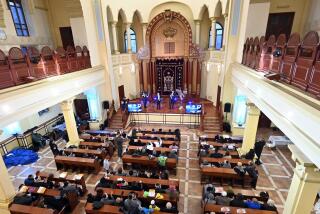Many Soviet Reforms for Jews Called Deceptive
- Share via
Moscow’s first kosher restaurant opened recently, said former Soviet Jewish refusenik Vladimir Slepak, but you can’t get so much as a bowl of chicken soup unless you can pay with Western currency.
A Yiddish theater has also been established, the 60-year-old electronics engineer added, but much of the cast is not even Jewish.
True, some of the religious reforms of the Gorbachev regime have proven meaningful, the gray-bearded Slepak summed up, but all too often “it’s a big show to deceive people in the West.”
In order to tell their side and to keep the pressure on the Soviets, particularly in light of President Reagan’s upcoming summit trip, Slepak and 10 other prominent former refuseniks are currently engaged on an around-the-globe tour, meeting with public officials, Jewish activists and the media.
At a press conference at Beth Jacob Congregation in Beverly Hills on Friday, speakers including Slepak and Alexander Lerner urged that future West-East trade agreements--on items ranging from computers to hamburgers--be linked to further relaxation of the Soviet Union’s traditionally restrictive emigration policies.
“There should be no illusions that now things are OK,” said Lerner, a 74-year-old cybernetics engineer who finally left Moscow last January after a 16-year fight. “Demand freedom for every Jew.”
Statistics compiled by the National Conference on Soviet Jewry show that more Jews were allowed to emigrate last month than during the entire year of 1986--1,088 compared to 914.
“But it’s still very difficult and, the point is, the change is not necessarily constant,” said 10-year refusenik Alexander Kholmiansky, 38, who estimated that hundreds of thousands of the Soviet Union’s estimated 2 million Jews would ultimately prefer to emigrate to the West.
According to Kholmiansky, Russian Jews are still not allowed to apply for exit visas without the written consent of close relatives--no matter what their age. Therefore, he said, scientist Vladimir Dashevsky, who is in his 50s, cannot apply to leave for Israel because his in-laws refuse to sign the consent form.
Kholmiansky, a computer engineer, and his wife, Anna, fought for 10 years for the right to emigrate before finally being allowed to leave the Soviet Union in February. During their battle, Kholmiansky, who taught Hebrew despite warnings that it would lead to trouble, spent two years behind bars for illegally possessing a gun in his apartment. The weapon, he said Friday, was planted by Soviet authorities.
At this point, “There are some positive changes--there are no new trials . . . there are less persecutions and no prosecutions of Hebrew teachers,” said Slepak, who tried to emigrate for 18 years and spent five years in Siberia for unfurling a banner in 1978 that read “Let Us Go.”
“But at the same time, the rules for immigration and applications have become more strict,” he said.
What’s more, for Jewish mothers raising children, the psychological stresses continue to be distressing, said Marta Abramovich, 48, a 10-year former refusenik.
“The children are forced to live a double life,” Abramovich explained. “They hear in school that Israel is a fascist state and at home that it’s the motherland.”
During Reagan’s visit, Abramovich said, 14 remaining female refuseniks plan to participate in a hunger strike “not of protest, but of despair.”
The touring former refuseniks, all of whom have emigrated to Israel since last October, have already traveled to London and are to leave for New Zealand and Australia next week.
During their stay in Los Angeles, they will participate in an open forum at Beth Jacob and take seemingly obligatory VIP tours of Universal Studios and Disneyland.
More to Read
Sign up for Essential California
The most important California stories and recommendations in your inbox every morning.
You may occasionally receive promotional content from the Los Angeles Times.










